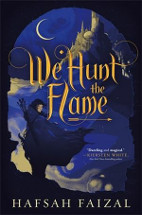We hunt the flame by Hafsah Faizal

Farrar Straus Giroux, 2019. ISBN: 9780374313647
(Age: 16+) Highly recommended. Fantasy.
Set in a fantasy world reminiscent of ancient Arabia, We hunt the
flame draws together two strong characters: Zafira, the hunter, a
woman dressed as a man, venturing into the dark Arz forest to hunt
animals to provide food for her people, and Nasir, the dark prince,
a feared hashashin assassin, who kills men on the orders of his
father the Sultan of Arawiya. "People lived because she killed" and
"people died because he lived".
Arawaya is a kingdom of five caliphates, under the rule of the
Sultan Ghameq, a ruler who has succumbed to evil, and who in his
continual quest for greater power is prepared to kill his own
people. The whole land has been cursed by the loss of the magic that
formerly protected it. Demenhur, Zafira's homeland, has become
blanketed in cold and snow, the people are starving, and the
darkness of the Arz forest is gradually encroaching further onto the
land. Only Zafira has been able to venture into the forest in her
hunt for prey and been able to return alive and unharmed. An
encounter with the Silver Witch challenges her to go further into
the forest and then across to the island of Sharr to retrieve the
lost power of magic. Unknown to her, the Dark Prince, the assassin,
has also been sent on the same quest to gain the power for his
father.
Faisal has created an amazing fantasy world, with a Middle Eastern
flavour. The men wear turbans or keffiyeh and thobes; and Zafira
shields her identity with a hooded cloak. In Demenhur the caliph
refuses to allow the women any rights or recognise their
capabilities, whilst in neighbouring Zaram there were female
warriors. Each of the caliphates is different, just as the countries
of the Middle East are different. The current situation in Syria has
its reflection in the story of the ruthless Sultan Gharmeq and his
plans to overcome his subjects with a deadly poison gas, with small
children among his victims.
Faizal's writing style is rich and poetic and includes many Arabic
words, a joy for Arabic speakers or Arabic language learners. There
is no need for a glossary though as words reveal their meanings in
context and the reader gradually becomes familiar with a basic
vocabulary.
The author's photograph is shown on the back cover. An American
Muslim, she appears in her black niqab, clothing she is proud to
wear. It is wonderful that she has been able to bring the world of
Arabic culture and history that she knows so well to this gripping
story of mystery, adventure and romance, made so much more
interesting with its Arabian flavour.
While the story twists to a dramatic ending, there are clearly
threads that can be picked up again, and no doubt there will be a
sequel. Readers of We hunt the flame will be eagerly awaiting the
next book.
Helen Eddy